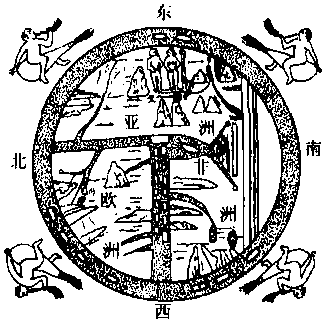789年
牧师利巴涅恩西斯[西]著《启示录注释》时,附有一幅大地形状图(图)。图为圆盘形状,“有人居住的世界”占据整个圆盘,大地中间由一“T”字分割大陆为洲。“T”字的一竖表示地中海,把欧洲和非洲分开。一竖中间有一些小陆地,表示地中海中诸岛;一横的两半分别为顿河和尼罗河,圆盘的上方画有表示“天国”和“乐园”的图像。这种轮形地图表示古老民族原始的寰宇观念。

利巴涅恩西斯的世界图
| 词条 | 789年 |
| 类别 | 中文百科知识 |
| 释义 | 789年牧师利巴涅恩西斯[西]著《启示录注释》时,附有一幅大地形状图(图)。图为圆盘形状,“有人居住的世界”占据整个圆盘,大地中间由一“T”字分割大陆为洲。“T”字的一竖表示地中海,把欧洲和非洲分开。一竖中间有一些小陆地,表示地中海中诸岛;一横的两半分别为顿河和尼罗河,圆盘的上方画有表示“天国”和“乐园”的图像。这种轮形地图表示古老民族原始的寰宇观念。
利巴涅恩西斯的世界图 |
| 随便看 |
开放百科全书收录579518条英语、德语、日语等多语种百科知识,基本涵盖了大多数领域的百科知识,是一部内容自由、开放的电子版国际百科全书。